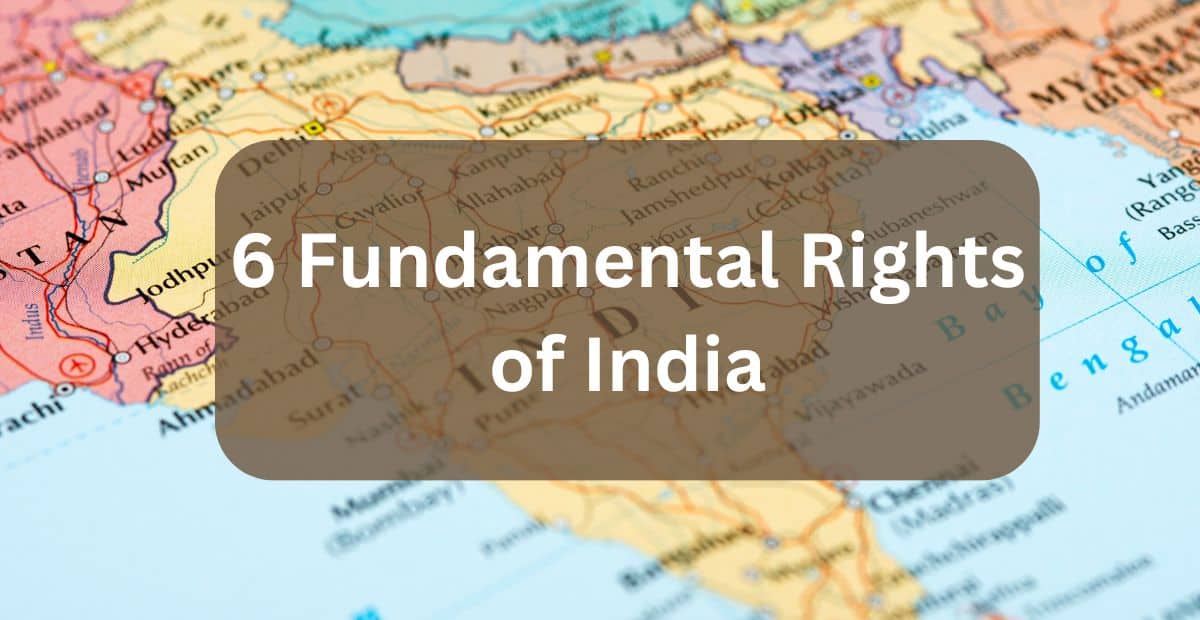Most of the countries in the world today have democratic governance. Maximizing the personality development of citizens is the main objective of democratic governance. Freedom is necessary for personality development.

Freedom is created by the combination of various necessary rights. The essential rights of citizens need to be recognized and protected in a democratic state.
So every democratic constitution provides certain essential rights to its citizens. We call those rights fundamental rights.
In this article, I will explain the 6 Fundamental Rights of India that are mentioned in the Indian Constitution. It’s crucial to understand these rights because they have a significant impact on our society.
As a citizen, it is our duty to know our rights and make sure they are respected and fulfilled. These 6 fundamental rights not only shape our identity as proud Indians but also serve as guiding principles for the citizens of our country.
Table of Contents
The Background of the Fundamental Rights of India
The background of the fundamental rights of India can be traced back to the freedom struggle and the vision of leaders who fought for independence and social justice. During the colonial era, Indians faced oppression and discrimination, which spurred the need for a comprehensive framework of rights to safeguard individual liberties and promote equality.
The Indian National Congress was founded in 1885. It played a crucial role in advocating for political rights and self-governance. As the freedom movement gained momentum, leaders like Mahatma Gandhi, Jawaharlal Nehru, Dr. B.R. Ambedkar, and others emphasized the importance of fundamental rights in shaping a just and inclusive society.
The demand for fundamental rights widened during the drafting of the Indian Constitution. The Constituent Assembly worked tirelessly to frame a Constitution that would reflect the aspirations and values of the Indian people.
This committee, under the chairmanship of Dr. B.R. Ambedkar, was entrusted with the task of formulating fundamental rights. Ambedkar looked to various sources such as the Universal Declaration of Human Rights, the American Bill of Rights, and concepts of justice and equality for inspiration.
The Constitution of India, enacted on January 26, 1950, enshrined a comprehensive set of fundamental rights. These rights were incorporated in Part III (Articles 12-35) and aimed to protect individual liberties, promote social justice, and ensure equal opportunities for all citizens.
Over the years, the interpretation and enforcement of fundamental rights of India have evolved through landmark judicial decisions. The Indian judiciary has played a crucial role in safeguarding these rights and expanding their scope to address emerging challenges and protect the interests of marginalized communities.
Today, the fundamental rights of India continue to be the foundation of the country’s legal system, guiding the principles of justice, liberty, equality, and fraternity. They shape the identity of the nation and serve as a constant reminder of the aspirations and values that underpin Indian democracy.
6 Fundamental Rights of India
The fundamental rights of India are enshrined in Articles 12 to 35 of the Indian Constitution in Part III. A total of 7 fundamental rights were mentioned in the original constitution.
The right to property was removed from the list of fundamental rights by the 44th Constitutional Amendment of 1978. Property rights have now become legal rights and are protected in Article 300 (A). Here are the 6 fundamental rights of India:
- Right to Equality [Article 14- 18]
- Right to Freedom [Article 19-22]
- Rights against Exploitation [Article 23-24]
- Right to Freedom of Religion [ Article 25-28]
- Cultural and Educational Rights [Article 29-30]
- Right to Constitutional Remedies [Article 32-35]
Right to Equality [Article 14-18]
The Preamble of the Indian Constitution proclaims the noble determination to establish equality of dignity and opportunity for all. In order to implement this, five articles 14 to 18 of the Constitution enshrined provisions on the right to equality.
Everyone is equal in the eyes of the law (Article 14)
According to Article 14, “The State shall not deny to any person equality before the law or the equal protection of the laws within the territory of India.”
‘Equality before the law’ means no person is above the law of the land irrespective of status and status. All individuals, from the Prime Minister to the common citizen, are subject to the common law of the land and subject to the jurisdiction of the common courts. Every person is equally responsible before the law for all his acts.
‘the equal protection of the laws’- means that the laws will be applied equally to all who are in the same situation. The State shall not discriminate between similarly situated persons.
Discriminatory behavior is prohibited (Article 15)
Article 15 of the Constitution deals with the establishment of the equal social status of citizens. According to this clause, the state cannot discriminate against any citizen solely on the basis of religion, caste, sex, place of birth, or any of them.
Equality in government jobs (Article 16)
Article 16 of the Constitution provides for equal opportunity for all citizens in appointment to public service or post. No citizen in terms of caste, religion, place of birth, sex, or any of these reasons shall be disqualified for appointment to Government service. Apart from recruitment, this rule will also apply to pay, promotion, leave, pension, etc.
Rights against untouchability (Article 17)
The social system of traditional India was stratified on the basis of caste and caste. Such a social structure creates an incurable disease like untouchability. Untouchability is the bane of Indian society. Article 17 abolished this disease from our society.
Depriving a person of his privileges or rights or insulting him on account of untouchability shall be a punishable offense under the law.
Abolition of Title (Article 18)
Equality and special status are incompatible with each other. Hence the system of conferring distinctive titles has been abolished. The State shall not confer any title or designation under this article that is not indicative of military or academic merit.
Right to Freedom [Article 19-22]
The right to freedom is mentioned in Articles 19 to 22 of the Indian Constitution. It grants citizens certain fundamental freedoms. These are-
- Freedom of Speech and Expression
- Freedom to Assemble Peacefully
- Freedom to Form Associations and Unions
- Freedom to Move Freely
- Freedom to Practice Professions
- Protection in Respect of Conviction for Offences
- Right to Life and Personal Liberty
- Protection against Arrest and Detention
Let’s explore each aspect of this freedom and right:
1. Freedom of Speech and Expression [Article 19(1)(a)]
People can freely express their thoughts, opinions, and ideas without any restrictions. This includes the right to speak, write, print, publish, and communicate freely, subject to reasonable restrictions in the interest of public order, decency, morality, or sovereignty.
2. Freedom to Assemble Peacefully (Article 19(1)(b)):
Citizens have the right to gather peacefully for various purposes, such as protests, meetings, and demonstrations. However, there are certain limitations to this right that may be imposed in the best interest of maintaining public order and safeguarding the sovereignty and integrity of India.
3. Freedom to Form Associations and Unions (Article 19(1)(c)):
Citizens have the freedom to form associations, societies, unions, or organizations for specific purposes. This right enables people to come together and collectively pursue common goals. However, restrictions can be imposed on this right in the interest of public order, morality, or sovereignty.
4. Freedom to Move Freely (Article 19(1)(d)):
Every citizen has the right to move freely throughout the territory of India. This includes the freedom to reside and settle in any part of the country. However, certain restrictions can be imposed on this right on the grounds of public interest, including security, morality, and health.
5. Freedom to Practice Professions (Article 19(1)(g)):
Citizens have the right to choose and practice any profession, occupation, trade, or business of their choice. This right allows individuals to engage in economic activities and pursue their livelihoods freely. However, the state can impose reasonable restrictions to protect the public interest, prevent unfair practices, or ensure professional qualifications.
6. Protection in Respect of Conviction for Offences (Article 20):
This aspect ensures that no person can be punished for an act that was not an offense when committed or subjected to a heavier punishment than what was applicable at the time of the offense. It also guarantees protection against double jeopardy, which means being tried for the same offense more than once.
7. Right to Life and Personal Liberty (Article 21)
Article 21 is often regarded as the heart of the Indian Constitution. It states that “no person shall be deprived of their life or personal liberty except according to the procedure established by law”. This right encompasses a broad spectrum of rights, including the right to live with dignity, the right to privacy, and protection from arbitrary state action. It ensures that individuals are free to make choices and live their lives without unnecessary interference from the government.
8. Protection against Arrest and Detention (Article 22)
Article 22 provides safeguards to protect individuals against arbitrary arrest and detention. It outlines certain rights that must be granted to a person who is arrested or detained. These rights include the right to be informed about the grounds of arrest, the right to consult and be defended by a legal practitioner, and the right to be produced before a magistrate within 24 hours of arrest. This article ensures that the process of arrest and detention is fair and transparent, safeguarding the rights of the accused.
The right to freedom is crucial for fostering democracy, promoting individual autonomy, and encouraging active citizen participation. However, it is important to note that these rights are not absolute and can be subject to reasonable restrictions imposed in the interest of public order, morality, and the security of the nation except in Article 21.
Rights against Exploitation [Article 23-24]
Rights against Exploitation are mentioned in Articles 23 and 24 of the Indian Constitution. It provides crucial protection against various forms of exploitation. Let’s understand these rights in simpler terms:
Prohibition of Trafficking and Forced Labor (Article 23)
Article 23 prohibits human trafficking and any form of forced labor. It ensures that no person can be bought, sold, or forced into any kind of slavery or bonded labor. This right protects individuals from being exploited and ensures their freedom and dignity.
Prohibition of Child Labor (Article 24)
Article 24 specifically addresses the issue of child labor. It states that no child below the age of 14 can be employed in any hazardous occupation or engaged in any work that deprives them of their childhood, education, and overall development. This right aims to protect the rights and well-being of children, allowing them to grow and learn in a safe and nurturing environment.
These rights against exploitation are crucial in safeguarding the vulnerable sections of society and promoting social justice. They emphasize the importance of treating every individual with dignity and respect, ensuring that no person is subjected to forced labor, trafficking, or child exploitation.
By guaranteeing these rights, the Indian Constitution seeks to eradicate exploitative practices, promote fair labor practices, and protect the most vulnerable members of society. It highlights the commitment of the nation to uphold human dignity and create a society free from exploitation and injustice.
Right to Freedom of Religion [ Article 25-28]
The right to freedom of religion is mentioned in Articles 25 to 28 of the Indian Constitution, which grants individuals the freedom to practice and follow any religion of their choice.
Let’s understand this right in simpler terms:
Freedom of Conscience and Free Profession, Practice, and Propagation of Religion (Article 25)
Article 25 ensures that every individual has the freedom to follow their own beliefs, religion, or faith. It allows people to freely practice and profess their religion without any interference. This right includes the freedom to worship, perform religious rituals, and propagate one’s religion.
Freedom to Manage Religious Affairs (Article 26)
Article 26 recognizes the right of religious communities or denominations to manage their own religious affairs, establish and maintain religious institutions, and administer them according to their customs and traditions. This ensures that religious communities have autonomy and can regulate their internal affairs without external interference.
Freedom from Compulsory Religious Taxes (Article 27)
Article 27 prohibits the levying of any religious tax to fund or support any particular religion. This ensures that individuals are not compelled to contribute financially to a religious practice or institution against their will.
Freedom from Religious Instruction in Educational Institutions (Article 28)
Article 28 of the Indian Constitution ensures that educational institutions that receive complete funding from the state are not allowed to provide religious instruction.
This means that in such institutions, teachings related to any specific religion are prohibited to maintain a secular environment in education.
However, it allows religious instruction to be provided in educational institutions run by religious groups, with the voluntary participation of students.
These rights collectively protect individuals’ freedom of conscience, the practice of their chosen religion, and the autonomy of religious communities. They uphold the principles of religious diversity, tolerance, and secularism in India. These provisions aim to ensure that every person has the freedom to follow and practice their religion without fear of discrimination or coercion.
The right to freedom of religion plays a vital role in promoting harmony, respect, and peaceful coexistence among different religious communities in India. It reflects the values of religious pluralism and the recognition of individual beliefs as integral components of a democratic and inclusive society.
Cultural and Educational Rights [Article 29-30]
Cultural and educational rights, as stated in Articles 29 and 30 of the Indian Constitution, recognize and protect the diverse cultural and educational interests of citizens. Let’s understand these rights in a simple and unique manner:
Protection of Cultural and Educational Interests (Article 29)
Article 29 safeguards the rights of individuals and communities of different cultures, religions, or linguistic backgrounds. It ensures that they have the freedom to conserve and promote their distinct language, script, culture, and heritage. This article emphasizes the importance of preserving the rich cultural diversity of India.
Right of Minorities to Establish and Administer Educational Institutions (Article 30)
Article 30 grants linguistic and religious minorities the right to establish and manage educational institutions. It ensures that minorities can provide a quality education that aligns with their cultural and linguistic values. This right allows minority communities to protect and nurture their unique identity through educational institutions.
These cultural and educational rights play a significant role in promoting inclusivity, diversity, and equal opportunities for all citizens. They recognize the importance of preserving cultural heritage and promoting academic autonomy among minority communities. These rights aim to create an environment where individuals and communities can flourish while maintaining their distinct identities and contributing to the progress of the nation.
By protecting cultural and educational interests, the Indian Constitution ensures that everyone has the right to celebrate and express their cultural heritage and provides opportunities for minority communities to establish and manage educational institutions that cater to their specific needs.
Right to Constitutional Remedies [Article 32-35]
The right to constitutional remedies, encompassed in Articles 32 to 35 of the Indian Constitution, provides a powerful tool to protect our fundamental rights. Let’s understand this simply:
Right to Constitutional Remedies (Article 32)
Article 32 grants every individual the right to approach the Supreme Court of India for the enforcement of their fundamental rights. This means that if our fundamental rights are violated or denied, we have the right to seek justice and remedies directly from the highest court of the land. It ensures that our rights are not merely words on paper, but actionable and enforceable in a court of law.
Power of Parliament to Modify Rights in Armed Forces (Article 33)
Article 33 allows Parliament to restrict or modify the fundamental rights of members serving in the armed forces, paramilitary forces, police forces, or intelligence agencies. This provision ensures that discipline and efficiency are maintained within these forces while balancing the rights of individuals serving in them.
Restriction on Rights during Emergency (Article 34)
Article 34 allows the government to temporarily suspend certain fundamental rights during a proclaimed state of emergency. This provision enables the government to take necessary measures to protect national security and maintain public order during times of grave crisis.
Protection of Laws Validating Certain Acts (Article 35)
Article 35 protects laws that validate certain acts, even if they would otherwise be considered as violations of fundamental rights. This provision ensures that legislative actions taken in the past, which may have affected our rights, are not retrospectively deemed invalid.
These provisions collectively empower individuals to seek justice and remedy if their fundamental rights are infringed upon. They also recognize the need for balancing rights with other important considerations such as national security and emergencies. The right to constitutional remedies reinforces the principle that every citizen is entitled to a fair and just legal recourse when their rights are violated, ensuring that our Constitution remains a living document that protects and upholds our rights and liberties.
Conclusion
The fundamental rights of India are the cornerstone of our democracy, ensuring justice, equality, and freedom for all. These rights protect our liberty, prohibit exploitation, preserve cultural diversity, safeguard religious freedom, and provide remedies for their violation. It is our duty as citizens to be aware of these rights, actively uphold them, and create a society where they are respected. By embracing and implementing these rights, we contribute to a just and inclusive India. Let us strive together to protect and uphold these fundamental rights that define us as a nation.
let me share with you what you have learned from “6 Fundamental Rights of India: Rights That Define Us“
Must Read Guide- Uniform Civil Code(UCC): Toward a Common Legal System in India

